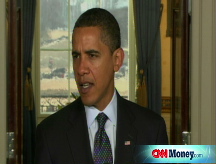CEO pay cuts: Not just for banks
Executives at financial firms are going to have to accept lower salaries and bonuses. Experts think the rest of Corporate America may soon follow suit.
NEW YORK (CNNMoney.com) -- Pay cuts could be coming to a corner office near you, even if you're not the CEO of a troubled bank.
The new federal rules limiting executive compensation announced by President Obama Wednesday may affect only a handful of the nation's most battered financial institutions currently.
But experts say the moves could be a sign of more government action on the issue of executive pay in the future.
Executive pay activists say the attention being given to the $18 billion in Wall Street bonuses at the same time many financial firms are losing money and tapping hundreds of billions of federal funds is making it easier for politicians to justify why salaries should be cut.
Alexander Cwirko-Godycki, research manager for executive compensation research firm Equilar, said that the U.S. public, not just Corporate America, has been reluctant to accept anything that smacks of pay caps in the past. But he said that the mood is now changing.
"In this case, it's the first time it's palatable to most people. There's a total lack of trust on Main Street for Wall Street," he said.
To be sure, this is not the first time Washington has tried to put caps on executive pay. But activists seem to be more encouraged that change will actually be effective this time
"This is different. The arguments against curbs don't make sense any longer. My friends will bring up the issue even before I do. Opinion has been galvanized," said Robert McCormick, chief policy officer for Glass Lewis & Co., a research firm advising institutional investors.
McCormick said it is almost certain that so called "say on pay" rules will pass Congress and be signed into law this year. In fact, Obama was a co-sponsor on such a measure when he was in Congress.
These rules allow for nonbinding shareholder votes on pay packages, and experts note that they have helped curb compensation in other countries, such as the United Kingdom..
But some are hoping for even more far reaching measures to combat excessive salaries and bonuses.
Nell Minow, co-founder of The Corporate Library, an indepedent corporate governance research firm, said a government-mandated change in rules on the election of corporate directors would be a far more effective way to rein in pay.
"The only thing that will make any difference is the ability to for shareholders to get rid of bad directors who vote for these bad pay packages," she said. "That way, once in a while, a director is going to say, 'Gee, I could vote for this pay plan, but maybe the shareholders wouldn't like it.'"
Minow and Cwirko-Godycki both expect modest declines in average executive pay when the numbers for 2008 are reported in the coming month.
But they think the drop is likely to be nowhere near as much as the forecast 12% decline in corporate earnings among S&P 500 companies, let alone the 38% decline in the value of their stocks.
And one expert, former compensation consultant Graef Crystal, who has been calling for changes to pay packages for the last 20 years, says he actually thinks CEO pay will be up in 2008.
Crystal said he's afraid that even if cash compensation is curbed somewhat, an increase in the issuance of stock and options will more than make up for the lower salaries.
"Executives don't like to go quietly in the night. Their idea of a Draconian sacrifice is to make the same money they did last year," he said.
But Minow said the fact that financial firms are likely to be forced to cut pay will remove one of the prime drivers of higher executive pay across corporate America.
"What happened was, you were the CEO of a big manufacturing company, you're visited by your investment banker. He's no smarter than you. He's not running a company larger than yours. But he's making three times as much money as you did. That made a lot of CEOs mad." ![]()




